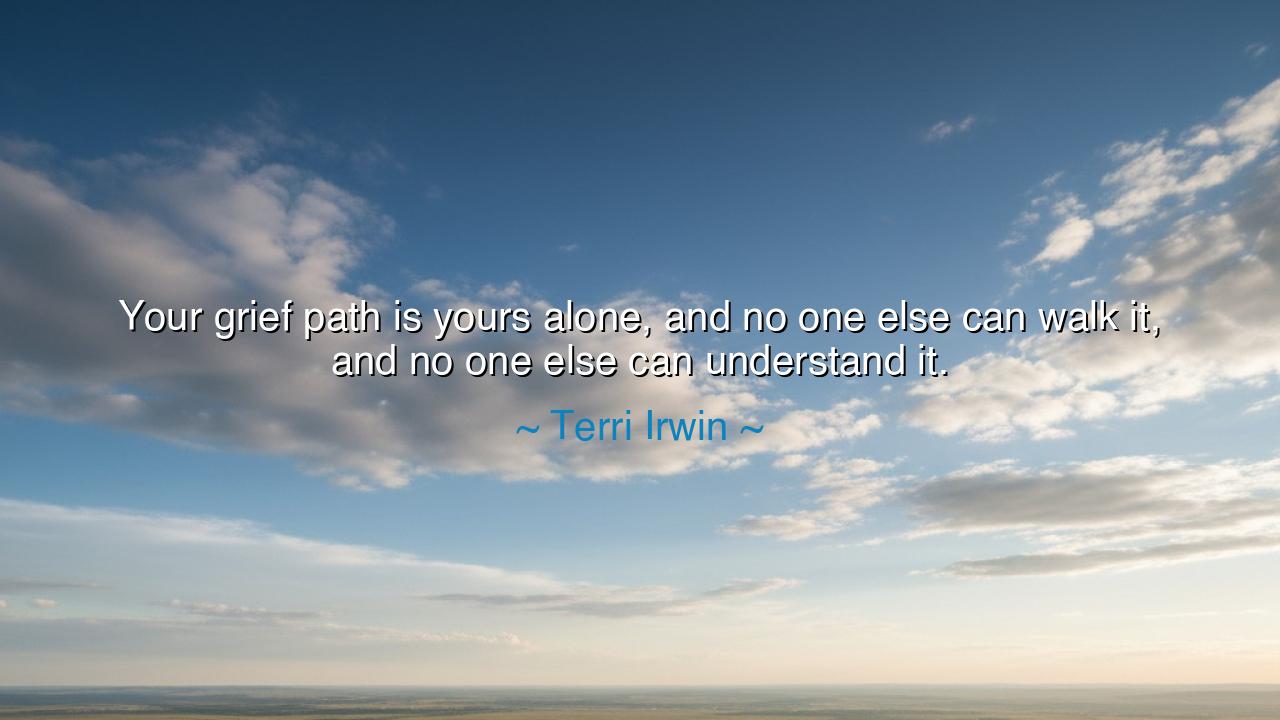
Your grief path is yours alone, and no one else can walk it, and
Your grief path is yours alone, and no one else can walk it, and no one else can understand it.






“Your grief path is yours alone, and no one else can walk it, and no one else can understand it.” — so spoke Terri Irwin, the wildlife conservationist and widow of the beloved naturalist Steve Irwin, whose sudden death shook the world. Her words, spoken from the depths of her own sorrow, carry a truth older than time: that grief is a solitary journey, a sacred road that each soul must travel by its own light. Though others may walk beside us in compassion, none can truly enter the secret country of our pain. The path of mourning winds through the innermost chambers of the heart, where even love’s tenderest hands cannot reach.
When Terri Irwin uttered these words, she was not seeking pity — she was speaking wisdom born of suffering. The loss of her husband was not only the loss of a companion, but of a shared life’s purpose, a dream built upon love, courage, and devotion to nature. The world saw her smile for the cameras, her strength in continuing his mission, but beneath that strength lay an ocean of solitude. Her statement is both confession and counsel: that no matter how universal the experience of loss, its shape is always personal. Each grief has its own language, its own rhythm, its own private geography.
To say that one’s “grief path is yours alone” is to recognize the individuality of the soul’s sorrow. Grief is not something that can be measured or compared; it cannot be hurried, shared evenly, or solved by sympathy. One person may weep openly; another may grow silent. One may find solace in faith, another in labor, another in stillness. Yet all travel the same unseen valley — a valley each must cross in their own way, at their own pace. Terri’s insight is gentle but unflinching: we cannot lend our feet to another’s walk, nor borrow theirs for our own. We may love, but love cannot erase the loneliness of loss.
Throughout history, many have learned this truth in the crucible of grief. Consider Queen Victoria, who, after the death of Prince Albert, withdrew from public life for years. Her people mourned with her, yet none could touch the depth of her sorrow, for it was hers alone — bound to her memories, her devotion, her silence. The same solitude haunted Abraham Lincoln, who carried the weight of countless losses during the Civil War, including that of his own child. His melancholy was not something his advisers or even his wife could dispel. Yet, from that solitude came his profound compassion — the understanding that every grieving heart bears an invisible burden that no one else can lift.
Terri Irwin’s words also offer a subtle kind of comfort: that the uniqueness of grief is not a curse, but a proof of love. We mourn deeply because we have loved deeply. To walk one’s grief path is to honor the bond that loss has not erased, but transformed. No one else can understand it, because no one else has lived your love, known your memories, or felt the texture of your shared days. In this way, grief becomes not only sorrow, but testimony — a reminder that what was lost was real, precious, and irreplaceable.
Yet even as she speaks of solitude, Terri does not counsel despair. Though none can walk your grief path for you, others may still walk beside you — silent companions offering presence rather than answers. The journey of mourning is long, but not without light. In time, as the path winds forward, the pain softens and wisdom grows. The heart learns to carry the absence not as a wound, but as a scar that speaks of survival. The traveler emerges changed — quieter, deeper, more compassionate, more alive.
Lesson: Do not flee from grief, and do not measure it by another’s pace. Accept it as your own sacred journey — a landscape only you can traverse. Allow yourself to feel what you must feel, for to deny grief is to deny love itself. Let others walk beside you, but know that the healing must rise from within. Speak if you need to; be silent if you must. Cry, rest, remember. In time, you will discover that the very solitude you feared has become your teacher — shaping your soul into something stronger, gentler, more human.
Thus, Terri Irwin’s words shine like a lantern for all who mourn. She reminds us that though the path of grief is lonely, it is not endless. To walk it is to walk toward peace, carrying both love and loss as twin companions. Your grief path is yours alone, but at its end waits not darkness, but understanding — the quiet strength of a soul that has loved, endured, and learned that even in sorrow, life still holds meaning.






AAdministratorAdministrator
Welcome, honored guests. Please leave a comment, we will respond soon